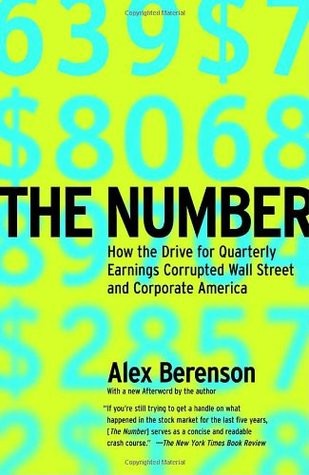
The Number
How the Drive for Quarterly Earnings Corrupted Wall Street and Corporate America
کتاب های مرتبط
- اطلاعات
- نقد و بررسی
- دیدگاه کاربران
نقد و بررسی

Starred review from February 10, 2003
In the wake of Enron's spectacular implosion, the scandals surrounding the collapse of Tyco's stock price and revelations that WorldCom inflated its earnings by $9 billion, many wonder how independent auditors could have overlooked such huge discrepancies in financial records. Others ask how the SEC failed to spot corporate fraud and errors of the accounting firms on such a scale when reviewing the annual reports. New York Times
reporter Berenson provides eye-opening answers to these and other equally disturbing questions in this hard-hitting and well-documented study. Against a background of the decline in independent investment research and the shift in client base for investment houses from individual investors to corporations, he charts the ascent of earnings per share—"the number"—to measure companies' health. As stock options became a major element in executive compensation and the consulting role of audit firms increased while the SEC neglected to pursue fraud on any major scale, Berenson argues, corporate executives' motives to manipulate "the number" met with a perfect opportunity to defraud unsuspecting investors, and many couldn't resist. His coruscating portrait of the boldness and reach of corporate fraud over the past five years is a clarion cry for reform. But his discussion of the SEC's shortcomings—due to lack of staff and budget in 2001, it could audit only 2,280 of the 14,000 annual reports received and has investigated a mere fraction of all allegations of fraud in corporations—shows the agency, created to protect investors from exactly what's happened, in the direst state of emergency. (On sale Mar. 4)Forecast:Individual investors and students of economic markets will be drawn to Berenson's wealth of detail and blistering attack on corporate greed and accounting firm complicity. The book's historical perspective and investigative stance should make it a classic of financial reporting on a tumultuous contemporary period in American financial history.

April 1, 2003
What went wrong with Enron, WorldCom, and other corporations, and why did the bubble burst on the stock market in 2000? To answer that question, argues Berenson, we must understand "why the system as a whole failed, why accounting and financial reporting became criminally shoddy." To that end, Berenson, a New York Times investigative reporter, takes us back to the pre-Crash 1920s and continues through the decades of bull and bear markets leading up to the 2002 passage of the Sarbanes-Oxley bill, which authorized an increase in the SEC's budget and created a new accounting oversight board. In the process, he covers budget problems at the SEC, the decline in Wall Street research, the ethical collapse of the accounting industry, and the bull market of the 1990s. The author addresses possible accounting improvements and shows that for big companies accrual accounting might make more sense than cash accounting. All in all, this work will be of value to anyone who wants to understand why the economy has declined and will also provide thought-provoking reading for experts in the field. Highly recommended for both public and academic libraries.-Lucy Heckman, St. John's Univ. Lib., Jamaica, NY
Copyright 2003 Library Journal, LLC Used with permission.

























دیدگاه کاربران